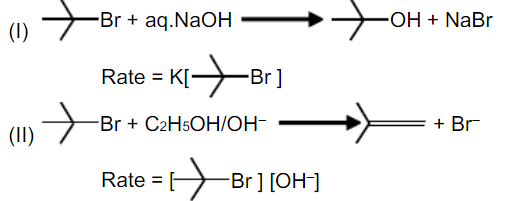Statement I Benzonitrile is prepared by the reaction of
chlorobenzene with potassium cyanide.
Statement II Cyanide (CN−) is a strong nucleoohile.
Statement I is correct, Statement II is correct Statement II is
the correct explanation of Statement
Statement I is correct, Statement II is correct Statement II is
not the correct explantion of Statement I
Statement I is correct, Statement II is incorrect
Statement I is incorrect, Statement II is correct
The correct Answer is:D
Step by step video, text & image solution for Statement I Benzonitrile is prepared by the reaction of chlorobenzene with potassium cyanide. Statement II Cyanide (CN^(-)) is a strong nucleoohile. by Chemistry experts to help you in doubts & scoring excellent marks in Class 12 exams.
Updated on:21/07/2023Topper's Solved these Questions
Similar Questions
Knowledge Check
Statement I Benzonitrile is prepared by the reaction of
chlorobenzene with potassium cyanide.
Statement II Cyanide (CN−) is a strong nucleoohile.AStatement 1 is true, statement 2 is true, statement 2 is a correct explanation for statement 1BStatement 1 is true, statement 2 is true, statement 2 is not a correct explanation for statement 1CStatement 1 is true, statement 2 is falseDStatement 1 is false, statement 2 is trueAssertion (A) : Benzonitrile is prepared by the reaction of chlorobenzene with KCN.
Reason (R) : Cyanide (CN−) is a strong nucleophile.ABoth A and R are true and R is the correct explanation of A.BBoth A and R are true but R is not a correct explanation of A.CA is true but R is false.DA is false but R is false.
Correct statement regarding these two reaction I and IIARate of I reaction remain unchanged if concentration of OH− increases.BRate of II reaction remain unchanged if concentration of OH− increases.CRate of both reactions become double if concentration of OH− become doubleDRate of both reactions donot depend upon concentration of OH−
Statement I: Ti is prepared in an atmosphere of Argon not H2
Statement II: Ti dissolves H2 and becomes brittle.
View SolutionStatement I : Oxygen gas is easily produced at a faster rate by heating mixture of potassium chlorate and manganese dioxide than heating potassium chlorate alone .
Statement II : Manganese dioxide acts as a negative catalyst .
View SolutionStatement-1: Unsymmetrical ketone reacts with HCN to give (dil) mixture of carbohydrine.
Statement-2: Cyanide ion is amident nucleophile.
View SolutionStatement -1 :An original solution containing excess of Ni2+ ions gives a yellow coloured solution with potassium cyanide solution.
Statement-2 :A solution of Ni2+ ions gives red precipitate with dimethylglyoxime solution just made alkaline with ammonia.
View SolutionStatement-1 :Cu2+ and Cd2+ ions form complexes with excess of potassium cyanide solution.
Statement-2 : On passing H2S gas, complex [Cu(CN)4]3− is not effected but [Cd(CN)4]2− gives yellow precipitated.
View Solution

